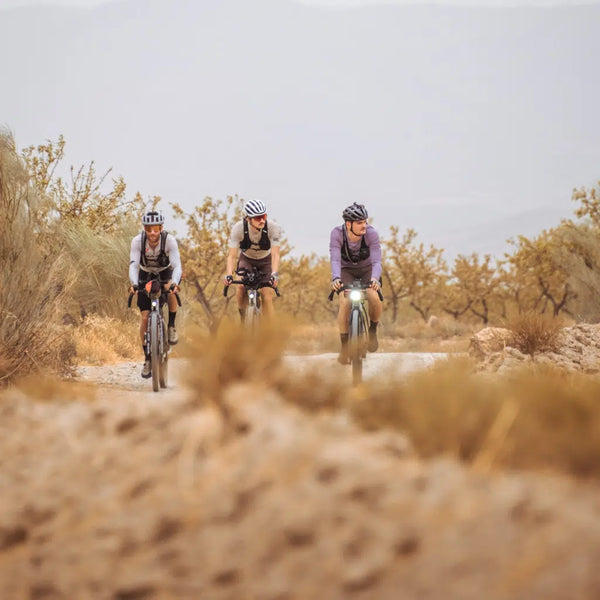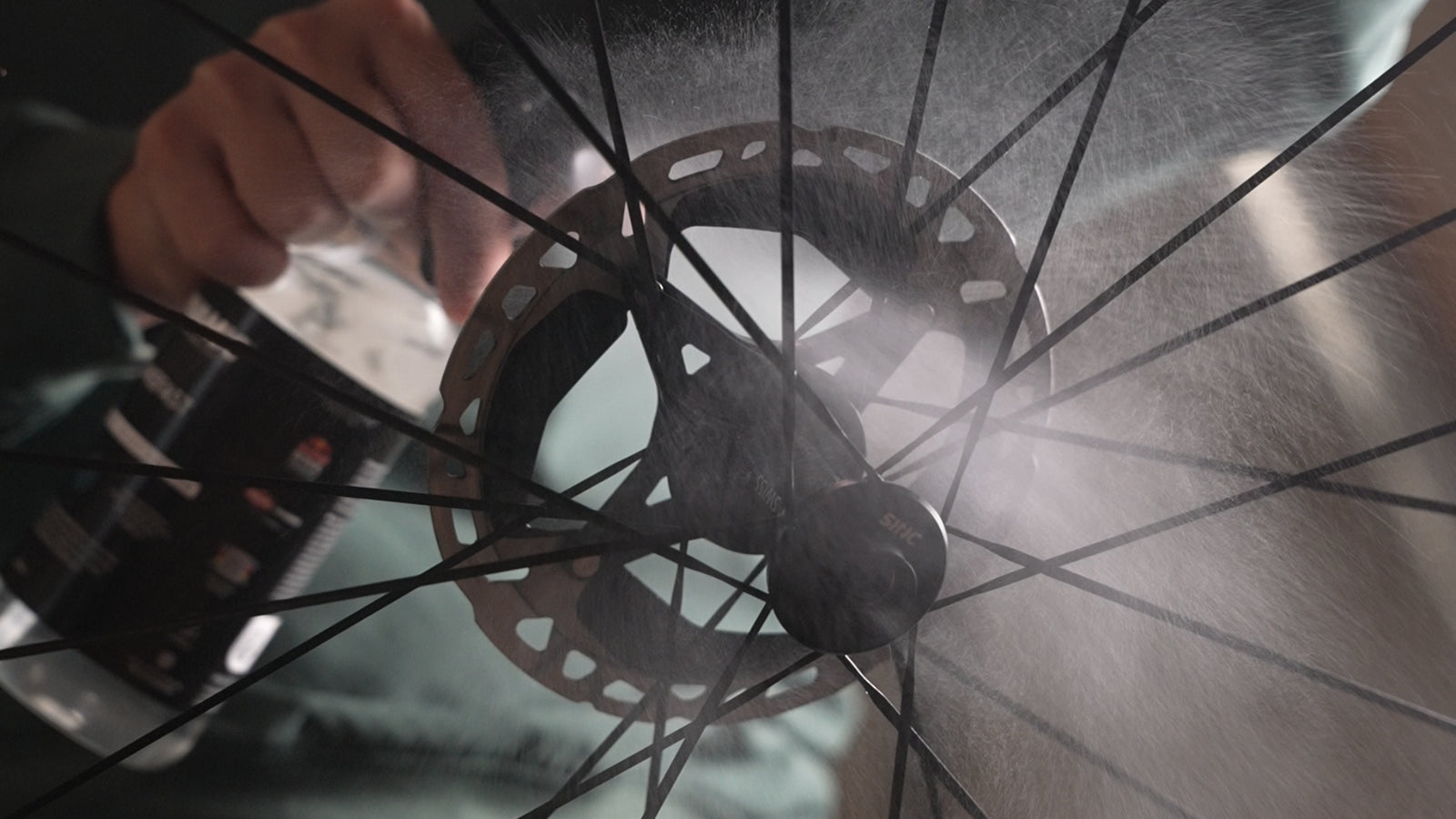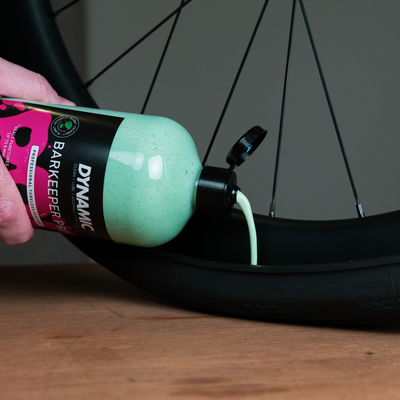A well-known sound among cyclists: the loud brake squeal when stopping for a traffic light. It’s probably one of the most annoying things. Lucky for you, you can prevent it with the right maintenance routine!
Contents
Why are my bikes brakes squealing?
The main reason for brake squeal are dirty or greasy braking parts. Particularly disc brakes are known for their high-pitched squeal when they are a bit greasy.
Your brakes can get dirty and greasy during your rides. For example, due to splashing water from the road or mud with oil residues in it. Water is also a frequent cause to make your brake squeal. When riding in the rain, you will suffer from squeaking disc brakes more often and quicker.
There are also other causes that will increase the disc brakes squeal. If you touch the brakes with your hands, which are naturally greasy, you already leave a greasy film on the disc or rim flange. Therefore, avoid touching these parts. In addition, residue from cleaning products can get on your brake parts, for example splatters of chain oil or residue from a finishing spray. Therefore, it is recommended not to use aerosols near the brakes and to first apply the spray on a cloth. By cleaning the discs as the last step in your routine, you make sure that there is no residue left that can cause noise.

Other causes of squeaky brake discs:
- Curved brake disc: If your brake disc is no longer straight, it can touch the brake pads while cycling, causing a squeaking sound. Your mechanic can bend the disc to a straight position with a special tool or recommend to mount new rotors.
- The caliper is not centered: Your disc brake should be centered on the caliper. If this is not the case, you can easily solve this by removing the bolts which mount the brake caliper to the frame or the fork. Then squeeze the brake lever while retightening the bolts. You can also use a specific tool for this procedure.
- Your brake pads are worn out: Worn brake pads can cause noises such as squeaking. You can replace them yourself or ask your mechanic.
What do I need to clean my brakes?
Cleaning your brakes is the last step in cleaning your bike. You will need a special brake cleaner that leaves no residue. Do not use a multi-spray or product containing oil to clean the brakes!
We recommend using these products:
-
Brake Cleaner, like Dynamic Brakefast!
This is our planet-friendly brake cleaner, offering the same powerful performance as conventional brake cleaners. Unlike hazardous traditional options, Brakefast is free from toxic gases, reducing health risks and making it safe for the environment. - Use a clean, dry cloth

How to clean the brakes?
Cleaning your brakes is the last step in cleaning your road bike, gravel bike or MTB. During the cleaning routine, residue from cleaning products, like a silicone spray, degreaser or chain oil, can leave some greasy particles on the brake parts. If the last step is cleaning your brakes, you can be sure that there is no residue left that causes the squeaking sound on your rotors, brake pads or rim flange. After cleaning, do not touch the brake parts anymore, the grease on your hands will make your brakes dirty again!

Clean the disc rotors
Cleaning the rotors of your disc brakes is quite easy. We recommend to take the time to degrease your rotors with Brakefast after every cleaning session. You do this as follows:
- Grab a dry, clean cloth and Brakefast. While cleaning, try not to hold the brake disc with your hands, touching them with the clean cloth is preferable.
- Spray the brake cleaner directly on the rotors on both sides. Make sure that you do not spray into the bearing, causing you to dissolve the bearing grease. This shortens the life of the bearings.
- Wipe away dirt and excess fluid from the rotor with the dry cloth.
You can also spray Brakefast on the cloth and use the cloth to apply the brake cleaner on the rotor.


Clean the brake pads
Check the disc brake pads regularly. To properly check the disc brake pads, you should always remove them. This is also a perfect moment to clean them right away.
- Remove the wheel from your bike.
- Make sure the locking pin of your brake pads or fuse pin of the cotter pin is loosened. Then you can easily pull the brake pads out.
- Remove all dirt by spraying Brakefast directly onto the pads.
- Dry the brake pads with a dry, clean cloth.
- Install your brake pads back into the brake before mounting your wheel again.
Clean rim brakes
Cleaning the rim brakes consists of two parts: cleaning the rim flange and cleaning the brake pads.
- Start with removing the wheel from your bike.
- Check the brake pads: if they are worn completely or unevenly worn, it is wise to replace the brake pads.
- If they are ok: clean the brake pads with a cloth on which you sprayed Brakefast. If the brake pads are very dirty, you can spray the brake cleaner directly on the pads.
- Then clean the rim flange. For this step, it is useful to spray some brake cleaner on a dry, clean cloth. Clean with this cloth along the aluminum brake edge.
Prevent brake squeal
Here are some ways to stop your disc brakes from squeaking.
- Preventive degreasing the brake components
- Breaking in new brake pads
- Bleed your brakes regularly
Preventive degreasing
The mechanics of our World Tour Teams degrease the rotors as a preventive measure before mounting them on the racing bikes. They do this by spraying Brakefast on the discs and dry them with a clean, dry cloth. Only then, they are mounted on the bikes.
Bedding brakes
If you have installed new brake pads for your disc brakes, you can improve the braking performance by bedding in the brake pads. The material of the brake pads is a resin. When braking, this resin melts and leaves a thin layer on the disc brakes, which ensures better braking performance.
Braking in is easy. You do this by letting the brakes heat up, causing the resin to melt. Accelerate to about 30 km/h on the first ride and brake hard until you are riding at a walking pace. Repeat about 20 times per brake. Some bike shops have a special brake machine for this.
Bleeding hydraulic brakes
If there is air in the brake system, your brake lever might react less directly, you lose braking power or the pistons can get stuck, which might produce noise. Bleeding your brakes ensures the air bubbles are removed from the hydraulic brake system. Your mechanic can help you with this, although there are also various explanation videos online. The method differs slightly per brand.

No more brake squeal
After reading this blog, you will know what you can do to reduce squeaking brakes. Keeping the brake parts in good condition is the first step. Include cleaning the brakes in your cleaning routine helps a lot to prevent your brakes from squeaking. Buy Brakefast here, with which you can prevent a lot of noises.
Related blog posts
Why the Dynamic Barkeeper system makes the difference Riding tubeless delivers more grip, more comfort and fewer punctures, as long as the foundation is right. In practice, the difference is rarely made by a single...




